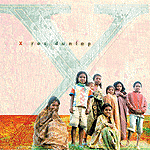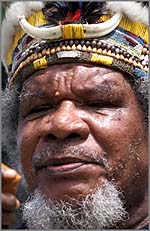|
HEL Music Productions presents
Music from/about/for Timor-Leste
|
|
Timor-Leste musician Ego Lemos has interpreted and modernised some of the most beautiful and heart-wrenching traditional melodies from his nation's history, and produced a wealth of original songs in its lingua-franca, Tetum. He sings about such topics as the centrality of water to life, the unceasing toil of Timor's peasant farmers, and the need for people to remain positive and to strive for unity. His poignant debut album O Hele Le demonstrates great intimacy and connection with his land.
Ros Dunlop has been a strong advocate of new music for the clarinet and bass clarinet all her professional life. She has premiered many new compositions by composers and performed in many countries of the world including Timor-Leste. Her first trip there was in 2002, performing concerts with Martin Wesley Smith. Since then, she has returned many times, recording Timor's traditional music. The US State Department has funded the production of a book - Klamar husi Avo ~ the traditional music of Timor-Leste, with accompanying CD and DVD in Tetum and English - that will be released in Timor later this year, the target audience being local youth. The Thirsty Night Singers hail from Berry, Cambewarra, Culburra and Kangaroo Valley. They consist of Nell Britton & Nadia Intihar (sopranos), Janette Carter & Patsy Radic (altos), Martin Wesley-Smith (tenor), and Peter Morgan & Peter Stanton (basses). |
| an image from X for clarinet & CD-ROM: |  |
[click photo to enlarge] |
from Dunlop and Wesley-Smith's concert tour of East Timor, March 2002 (click to enlarge):

|

|

|
|
Rob Wesley-Smith
with kids in Gleno [72K] |
audience in Ermera [58K]
photography (c) 2002 Martin Wesley-Smith |
Timorese young people
near Hato Bullico [128K]
|
|
"I had complete strangers coming up, with tear-stained faces (saying) how powerful it was ..."
about Hato' Knananuk No Toka, the body for which this concert is raising funds: In Timor-Leste, where so much is needed, the arts are not a priority. For those of us who know how important the arts can be in rebuilding communities and nations, as an antidote for trauma, we feel a void needs to be filled. Timorese musicians and artists need the same opportunities and access to supplies and learning that we enjoy in this country. Ego and Ros are committed to helping the musicians of Timor. To this end they have formed a musicians' collective called "Hato' Knananuk No Toka" (to express together - sing and play). This will give opportunities to musicians (both popular and traditional) in Timor-Leste to share information, accessories, workshops, jam sessions, and so on, providing a listening library and a performance space. We hope also to have a good supply of accessories for instruments, and a place where instruments can be donated and stored. A building has been promised but repairs are necessary. Visual artists in Timor do not have access to good quality materials and some funds will be put towards this purpose. |
TEKEE TOKEE TOMAK
Australian Multi-Media Works
reviewed by David Morris in Clarinet & Saxophone, London, Spring 2003
In another world, the fine golden screen at St Cyprian's provided a vivid backdrop for this multi-media programme. Before it stood a large screen of a different kind flanked by speakers on tall stands, and a modest projection and mixing desk set between the two front rows of the audience.
The evening opened with Gerard Brophy's Iza, a short but vigorous and warming duet for bass clarinets, performed by Natascha Briger and Ros Dunlop. Both players immediately established their proficiency, though throughout the evening it was the legato lines that fared best and sometimes a little of the rhythmic punch was lost to the big acoustic.
Down to business, however, and next was X by Martin Wesley-Smith. This was the first of several of his multi-media works, comprising slides, tape and clarinet. Lest there be any confusion, the slide show was not of the 'Could we have the next one, please Geoff' school, but a compelling sequence of images fading into one another, colours and textures constantly on the move, all under the control of the composer and his Macintosh. The tape merged broadcast sound bites with choral passages and electronic effects, big noise with jaunty instrumental numbers, all synchronised with the visual images. Over the top was Ros Dunlop's live clarinet. "X" refers to the resistance leader Xanana Gusmão, imprisoned in 1999 while the Indonesian military withdrew from East Timor. The images were brutal. So was the music, though the screaming clarinet might have benefited from some amplification to match the volume of the tape and heighten the anguish in the climactic passages. However, in quieter parts, Ros Dunlop's melancholy lines were serene.
Later came Wesley-Smith's short epic Welcome to the Hotel Turismo, in a similar format, but now observing the occupation of East Timor from the viewpoint of the eponymous hotel, still standing after all these years. No winds, just a cello and CD-ROM of sound bites and song, with a catchy refrain to rival anything by Don Henley. Despite the subject, the work had an easy flow and structure and Rachel Scott discharged the simultaneous vocal and amplified cello parts with passion and to great effect.
The item between these two was another worry given Amnesty International's past features on Central America. But the programmers were merciful and Stephen Ingham's Panama turned out to be a take on an old jazz standard, for clarinet, bass clarinet and a CD-ROM that provided a virtual jazz rhythm section to get the audience tapping along, if occasionally on the wrong beat.
The second half started in bright style with Tekee Tokee Tomak for clarinet and CD-ROM, Martin Wesley-Smith's portrayal of post-independence East Timor, full of smiling people and beautiful landscapes. For the next piece, the positive mood grabbed an attractive ideal and the two danced shoulder to shoulder in Dave Smith's snappily-titled Mitchell Principles and Laws on Central Albania, for two clarinets. The Mitchell in question appeared to be Ian, past Clarinet and Saxophone Society Chairman, who had premiered it, but his Principles were not obvious in this alternately angular and glissando-ridden romp. However, Natascha Briger and Ros Dunlop communicated the mood well here.
With Ros Dunlop back on bass clarinet and Martin Wesley-Smith on the CD-ROM, the evening was brought to a close with Merry-Go-Round, his treatment of contemporary Afghanistan. More scenes passed rapidly before us, including children and men having naive fun aboard a small home-made merry-go-round. This, we were told, was an allegory for the repeated invasions suffered by the people of Afghanistan, but it worked most powerfully as a striking reinforcement of common humanity.
In a multi-media show, attention is necessarily shared amongst the components. Music communicates, but to achieve a message as strong and specific as this, the various media components were tightly harnessed in support of the central theme. The clarinet as political blunt instrument. Placing the solo players beside a large bright screen, further from the audience and beyond the mixing console, visually reinforced the supporting nature of their role. However, with occasional balance problems against the tape at the climaxes and a big acoustic to fill, perhaps the clarinet writing didn't always get the attention it deserved. It would certainly have been more interesting to hear the clarinet lines more amplified, and perhaps for the instrumentalists to have been further forward.
Overall, the apolitical works set the human rights issues in perhaps greater relief, and ensured there was plenty of variation in the programme. The subject matter was often hard-hitting and it is unlikely anyone left the church unmoved, though not necessarily for musical reasons. "Tekee Tokee Tomak" apparently means something like "Let's all get together", and it was a refreshing experience to see our instrument used in support of such worldly issues.
TEKEE TOKEE TOMAK
February 6, 2003
reviewed by Carmel Budiardjo
The name rings bells. The Wesley-Smith family has such a long association
with East Timor. Rob is an old friend, an activist like myself who went the
long haul for East Timor from obscurity in the 1970s to stunning success
and international recognition more than two decades later. But I still had
to find out what his composer brother was all about, and here at last was
the opportunity.
The venue of the concert was a church in north London and the performers
were two clarinetists and a cellist, with Martin busily pressing buttons on
a video machine. An unusual combination, something quite new in artistic
presentation. It was good too to see quite a crowd of East Timorese in the
audience, for this novel experience.
The concert bore the name Tekee, Tokee, Tomak, a Tetum phrase meaning
'Let's all get together'. Yes, indeed!
Martin is a composer of considerable talent and versatility who has hit on
the idea of audio-visual presentation for many of his compositions. And
what could be a more suitable medium for his music than East Timor with so
many visual records of its tragic experience.
Most of the music performed was programme music, telling a story that is
helped by the visual presentation. But I have to say that when I first
heard his composition, Welcome to the Hotel Turismo, some months earlier
without the visual presentation, performed by the first class cellist,
Rachel Scott, I was immediately taken by its shape, its changing moods and
colour. A sombre and serious piece, like his other work, X, celebrating the
outstanding role of the East Timorese leader, Xanana Gusmao. Tekee, Tokee,
Tomak is a much happier piece, in which one feels the joy and high spirits
of the East Timorese, at last savouring their independence.
Included in the programme was a composition by Dave Smith, called Mitchell's Principles Based on Albanian Laws, a piece full of dance-like melodies. I happened to be sitting next to an Albanian woman who showed her delight at the composition. with themes so familiar to her. The Klezmer-like character of this piece had a particular appeal to me and provided a good balance to the programme.
The clarinetists Ros Dunlop and Natascha Briger performed superbly well and the combination of sound and visuals worked extremely well in helping to give the compositions greater depth and to appeal to a very mixed audience.
The group are to be congratulated for bringing together this event which was both artistically rewarding and a powerful tribute to the courageous people of East Timor.
flags courtesy of ITA's
Flags of All Countries; used with permission.
site updated June 13 2011
notes on the audio-visual pieces:
a review of 2003 concert in London by Dunlop & Wesley-Smith:
February 6, 2003
St Cyprian's Church, London NW1
My diary tells me that I had a clarinet lesson on Monday 20th May last year. Strangely, it neglects to mention that on that same day, the people of East Timor gained their independence, dollowing 24 years of Indonesian occupation. This British Music Information Centre-supported concert in St Cyprian's Church was part of a tour by Ros Dunlop and Martin Wesley-Smith (the Tekee Tokee Tomak Tour) to raise awareness of the struggle of East Timor to recover from its recent history of seemingly often brutal oppression.
another review of the same concert:
St Cyprian's Church, London NW1
It was a pleasant surprise to hear that Martin Wesley-Smith was in town and
would be presenting a concert of his music much of which is dedicated to
East Timor.






